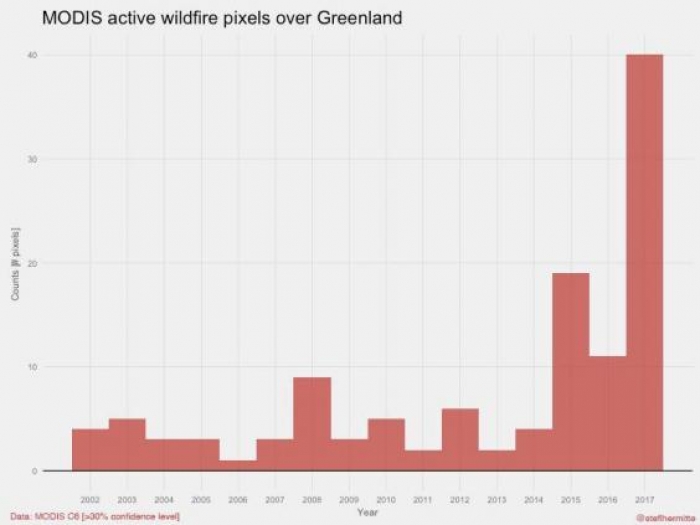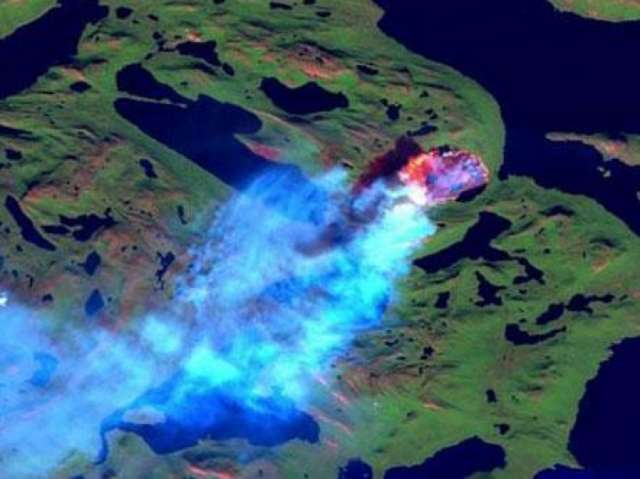Measured by pixels from the satellite images, wildfires have been at least twice larger or more prolonged than any year since 2002 when the first pictures were taken and more than four times every year apart from 2015 and 2016.
Professor Lhermitte tweeted: “Wildfires have occurred in the past over Greenland but 2017 is exceptional in number of active fire detections.”

A graph showing the number of pixels of wildfires in Greenland recorded by satellite (Professor Stef Lhermitte)
He said wildfires were not unknown in Greenland with reports of a major one taking place in 1996, but there was no way of knowing how large this was.
“This year’s [main] fire is a big one … it’s not a typical wildfire, it’s a rare and unusual event,” Professor Lhermitte told The Independent.
“This one is the biggest one in the satellite record that we know of.”
He said measuring wildfires by pixels meant the same wildfire would be recorded several times if it lasted long enough. The figures are also affected by cloud cover which could prevent the satellite detecting high temperatures that signal a fire.
There have been two fires this year, but of which started in July. The larger one is continuing but Professor Lhermitte said it was unknown whether the smaller one was still ablaze.
Asked if this was a sign of climate change, he said it was unclear because of the relatively short period covered by the satellite images.
The Nasa Earth Observatory also noted what it described as an “unusual event”.
“Satellites have detected a sizable wildfire burning in Greenland. The fire is in western Greenland, about 150 kilometers (90 miles) northeast of Sisimiut,” it said on its website, citing Professor Lhermitte’s research.
“Most of Greenland is covered by ice, but dwarf willows, shrubs, grasses, mosses, and other vegetation do live in some coastal areas.
“Satellites first detected evidence of the fire on July 31, 2017. The Moderate Resolution Imaging Spectroradiometer (Modis) and Visible Infrared Imaging Radiometer Suite Suomi NPP collected daily images of smoke streaming from the fire over the next week.
“While it is not unprecedented for satellites to observe fire activity in Greenland, a preliminary analysis shared by Stef Lhermitte … suggests that Modis has detected far more fire activity in Greenland in 2017 than it did during any other year since the sensor began collecting data.
“The fire appears to be burning through peat, noted Miami University scientist Jessica McCarty. It is not clear what triggered the fire.”
Increased size and number of wildfires is one of the expected consequences of climate change. Scientists have warned the US West has already entered a "new era of wildfires" with average temperatures in that part of the world now two degrees Celsius higher and the burning season nearly three months longer than in the 1970s.
Greenland's vast ice sheet, which could raise global sea levels by six metres, lost a trillion tonnes of ice between 2011 and 2014, according to one recent study which found the rate of melting had tripled.
Professor Marco Tedesco, a polar scientist at Columbia University, told Greenpeace's Energydesk that more research was needed to establish whether climate change was a factor in Greenland's wildfires.
“From a scientific point of view, we want to understand the sources of this fire. Was it an accident or a one-time event? Or was it part of a longer term trend that goes beyond the satellite data in 2000? What are the temperatures like? How many of these incidents have there been over the years?" he said.
“The good news (if any) is that today we have much better tools (remote sensing) than even just a few years ago and a higher number of scientists focusing on these topics. This hopefully will help us to shed some light on this very interesting event.”
More about: #Greenland #climatechange
















































